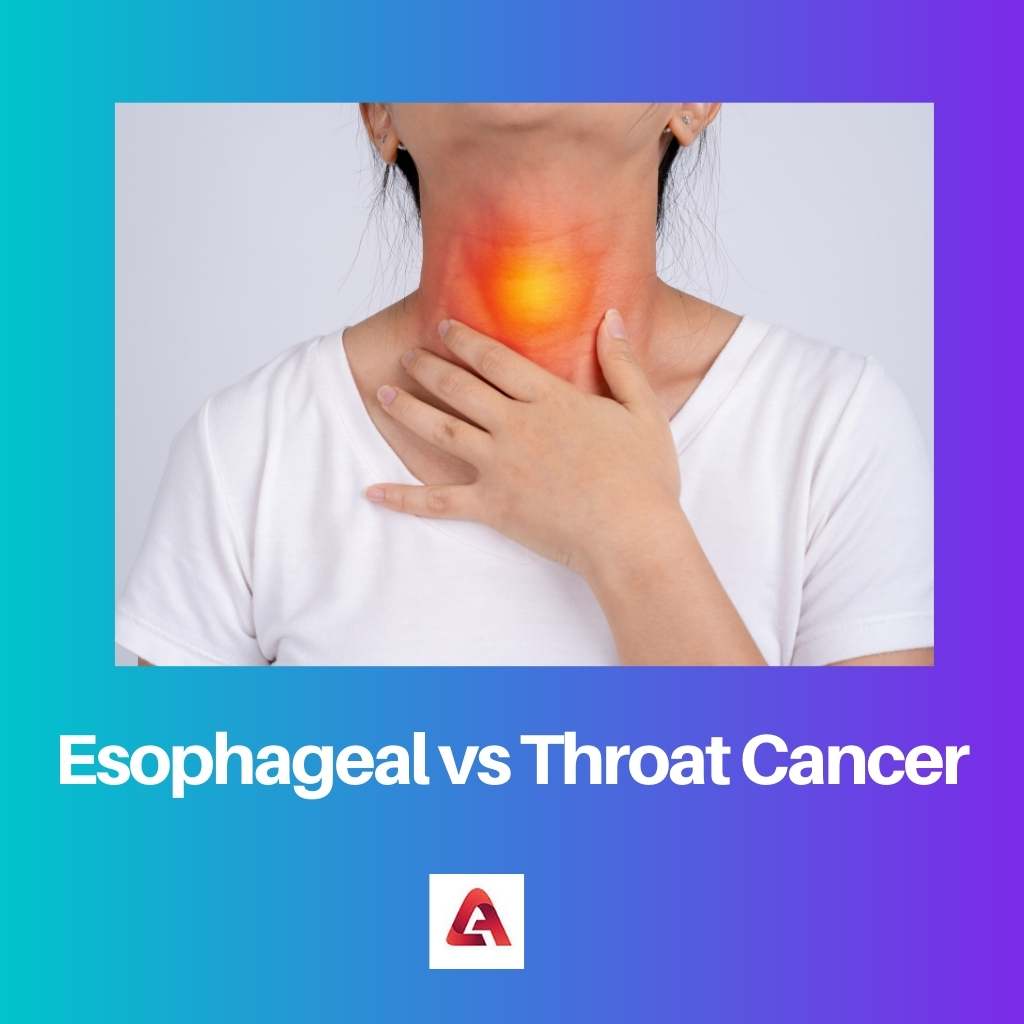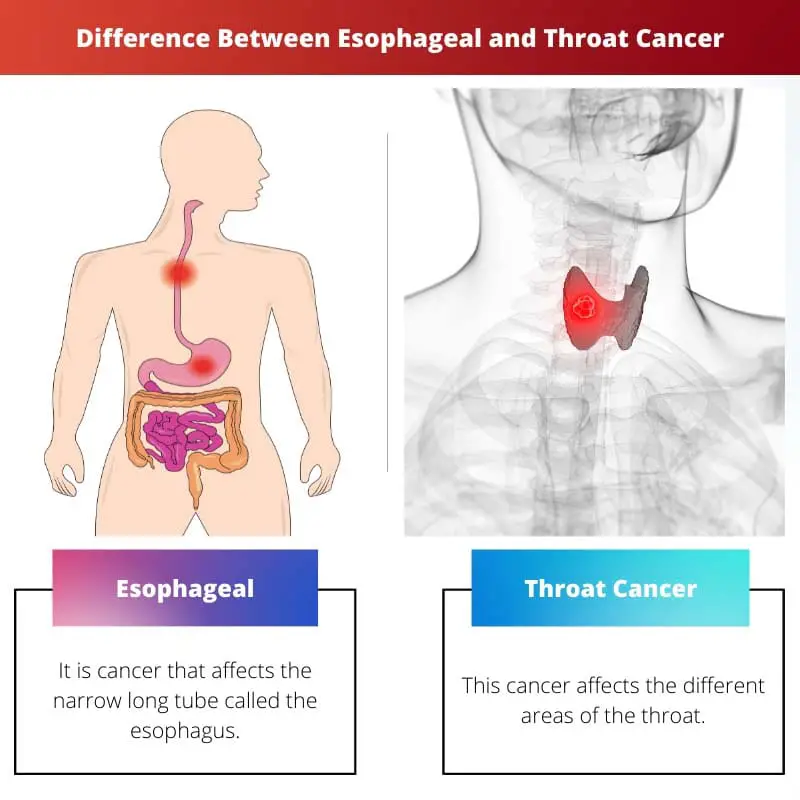Cancer is the most deadly disease today as it silently strikes you and develops at a speedy rate while spreading deadly cancer cells throughout the body that can quietly kill someone who doesn’t act against it right from the start.
\Many people get confused between esophageal and throat cancer: and some doctors also insist them to be the same: while others think they are different and affect the body independently.
Key Takeaways
- Esophageal cancer is a type of cancer that occurs in the esophagus, the tube that carries food from the mouth to the stomach.
- Throat cancer can refer to several types of cancer in the throat, including the larynx, pharynx, and tonsils.
- Esophageal cancer is more common in men and is caused by long-term acid reflux, while a variety of factors, including tobacco and alcohol use, can cause throat cancer.
Esophageal v/s Throat Cancer
Esophageal cancer is a type of cancer that affects the esophagus, which is a long tube-like structure in the body that goes from the mouth to the stomach. Throat cancer is a type of cancer that grows in the larynx area or the pharynx area and begins at the flat cells that cover the inside of a throat.

Esophageal is a type of cancer that affects the esophagus, which is a long and hollow tube-like structure that starts from your mouth and ends to the stomach.
This tube helps in transporting the food from the back of the throat to the stomach for the food to be digested.
Throat cancer is referred to as cancer that grows in the pharynx area or the voice box that is the Larynx area.
The throat is a tube made of muscles: that starts behind the nose till the end of the neck. Throat cancer initially begins at the flat cells covering the throat’s inside wall.
Comparison Table
| Parameters of Comparison | Esophageal | Throat Cancer |
|---|---|---|
| Definition | It is cancer that affects the narrow long tube called the esophagus. | This cancer affects the different areas of the throat. |
| Cause | It occurs when there is a change in the DNA of the cells in the esophagus. | It occurs when the throat’s cells start developing mutations which cause the cells to grow abnormally. |
| Signs and symptoms | Difficult to swallow food, pain in the chest, weight loss, etc. | Coughing, ear pain, voice change, sore throat, etc. |
| Affected area | Esophageal cancer affects the esophagus that starts from the mouth and ends in the stomach. | Throat cancer affects the voice box and upper or lower part of the throat. |
| Treatment | Treatment includes chemotherapy, radiation, Esophagogastrectomy, Gastrostomy, and Esophagectomy surgeries with medication. | Treatment includes chemotherapy, PEG, and radiation with Laryngectomy, Neck dissection, and Flap. |
What is Esophageal?
The esophagus is a long, hollow, narrow muscular tube that transports the food swallowed from the mouth to the stomach.
When an infectious tumor is formed in the inner lining of this tube, esophageal cancer occurs.
When this tumor develops, it attacks the muscles and tissues deep inside the esophagus and is found anywhere between the beginning of the tube it meets the stomach.
Esophageal cancer is found in two types, i.e., squamous cell carcinoma and Adenocarcinoma. Squamous cell carcinoma is found when cancer occurs in the flat cell lining of the esophagus.
This type of esophageal cancer is mostly found at the top or middle portion of the esophagus but can be seen anywhere.
Adenocarcinoma is the other form of esophageal cancer which occurs when cancer develops and matures in the esophagus glandular cells, which produce fluids like mucus.
This type of esophageal cancer is found in the lower part of the esophagus.
During the initial stage of esophageal cancer, the patient goes through many signs and symptoms, including weight loss, vomiting, heartburn, chronic coughing, hiccups, etc.
Just like most cancers, the reason why esophageal cancer is formed is not known yet, but it is believed that the mutations of the cell’s DNA cause the uncontrollable growth of cells which leads to the development of esophageal cancer in the body.
What is Throat Cancer?
Cancer that develops at your throat’s pharynx and larynx parts is known as throat cancer. The throat is a tube that extends from the nose to the neck.
Throat cancer initially affects the inner cell lining of the throat. The larynx, or the voice box, is right under the throat and exposed to throat cancer.
The larynx is composed of cartilage which has many vocal cords that fluctuate to produce sound while talking.
Though most throat cancer involves a similar form of cells, they are differentiated by using some specific terms that determine the location of cancer in the throat.
Nasopharyngeal is a type of cancer that develops in the nasopharynx, which is a region just behind the nose.
As the name suggests, oropharyngeal cancer matures at the oropharynx, the part behind the mouth region, and the tonsils.
Hypopharyngeal is cancer that affects the lower area of the throat, above the esophagus. Glottic cancer affects the vocal cords.
Supraglottic cancer develops at the top area of the larynx and affects the cartilage that stops food from falling into the windpipe.
And subglottic cancer develops in the bottom part of the voice box. All these cancers directly affect the throat, which causes coughing, voice changing, soreness of the throat, difficulty in eating, etc.

Main Differences Between Esophageal and Throat Cancer
- Esophageal cancer affects the esophagus, whereas throat cancer affects the pharynx and larynx areas of the throat.
- In esophageal cancer, the cancer is developed in the lining of the walls of the esophagus, whereas in throat cancer, the cancer is developed in the pharynx and larynx of the throat.
- Esophageal cancer develops in the cell linings and spreads throughout the esophagus when it matures, whereas throat cancer develops at the voice box and spreads to the other parts of the throat, which includes the lips, mouth, and nasal cavity.
- Esophageal cancer is caused by the changes in the DNA of cells in the esophagus, whereas throat cancer is caused due to uncontrollable growth of cells.
- The person affected with esophageal cancer will be in critical condition with malnutrition, whereas throat cancer makes the person mute.

- https://onlinelibrary.wiley.com/doi/abs/10.1002/ctm2.129
- https://www.sciencedirect.com/science/article/pii/S0889855309000053

This article was enlightening and incredibly informative. The tone of the article was very professional and educational.
This article does a great job of providing information on the subject. It is well-written and extremely informative.
This article is quite helpful for people who need to learn more about the differences between esophageal and throat cancer.
I have learned so much from this article. The differences between esophageal and throat cancer are clearer to me now.
The medical details in the article provided a deep insight into the difference between the two types of cancer.
This article delves into the minute differences between two types of cancer and is particularly informative for those seeking clarity on the subject.